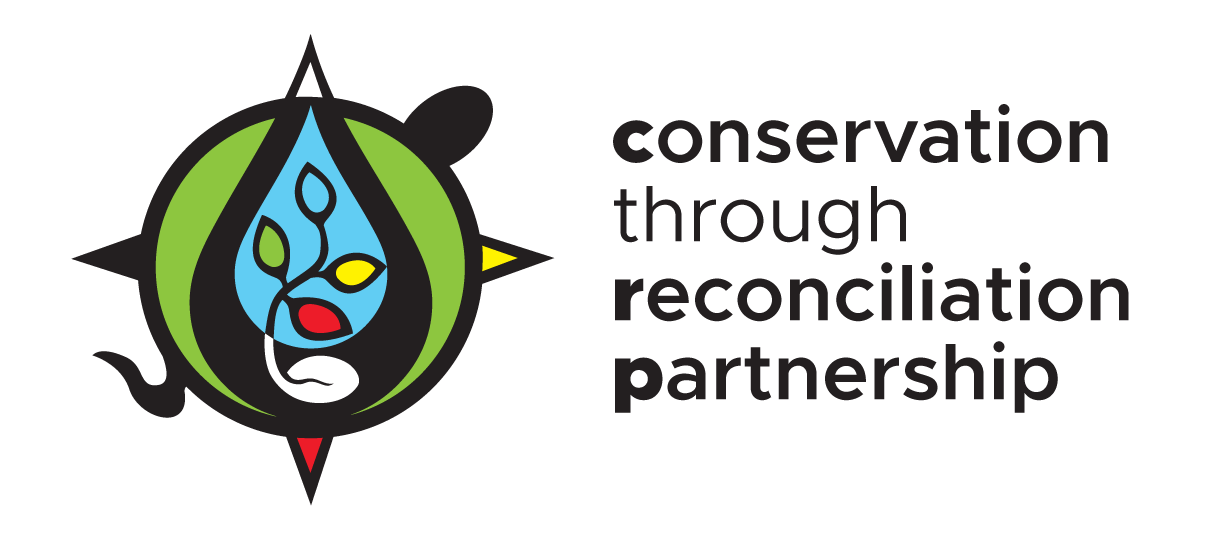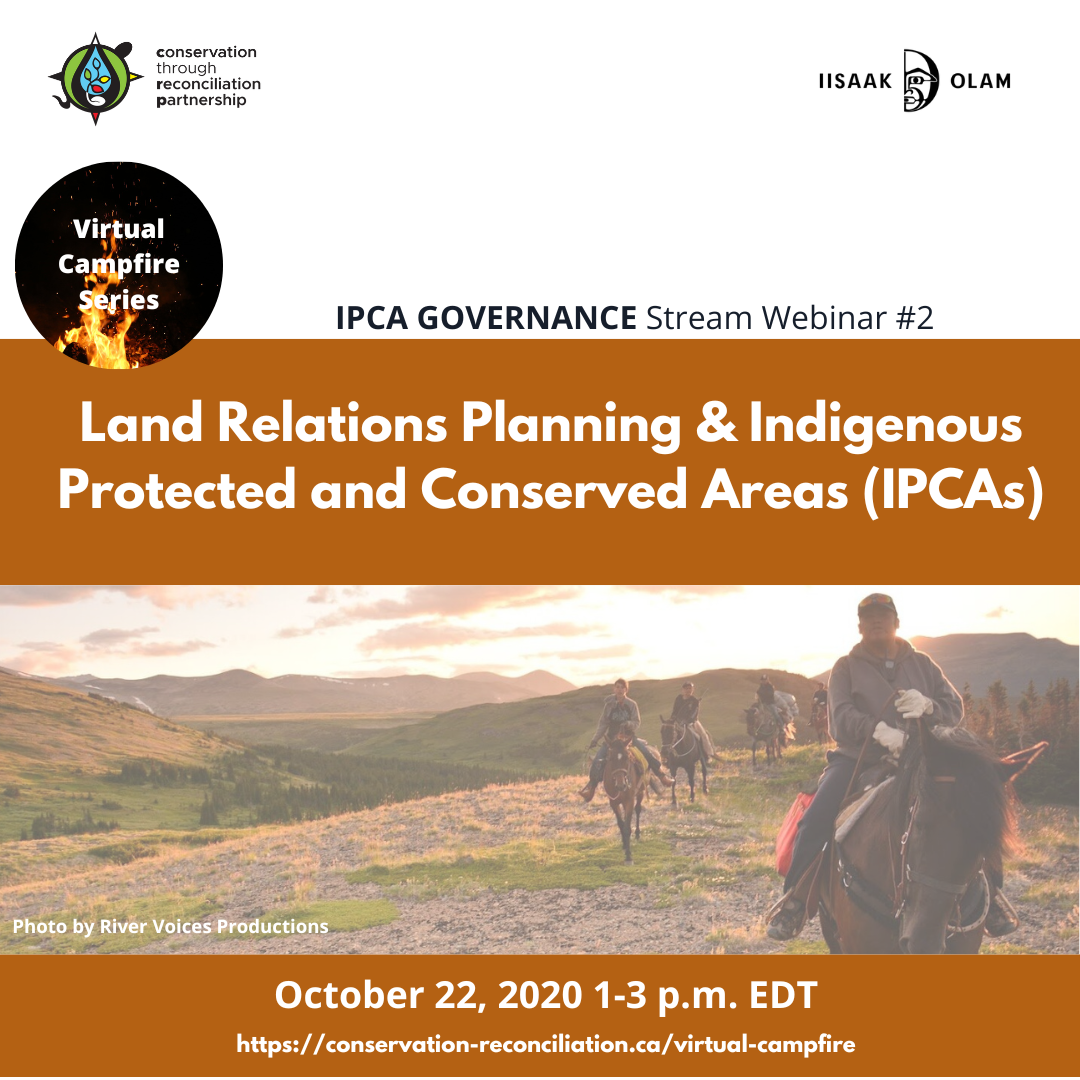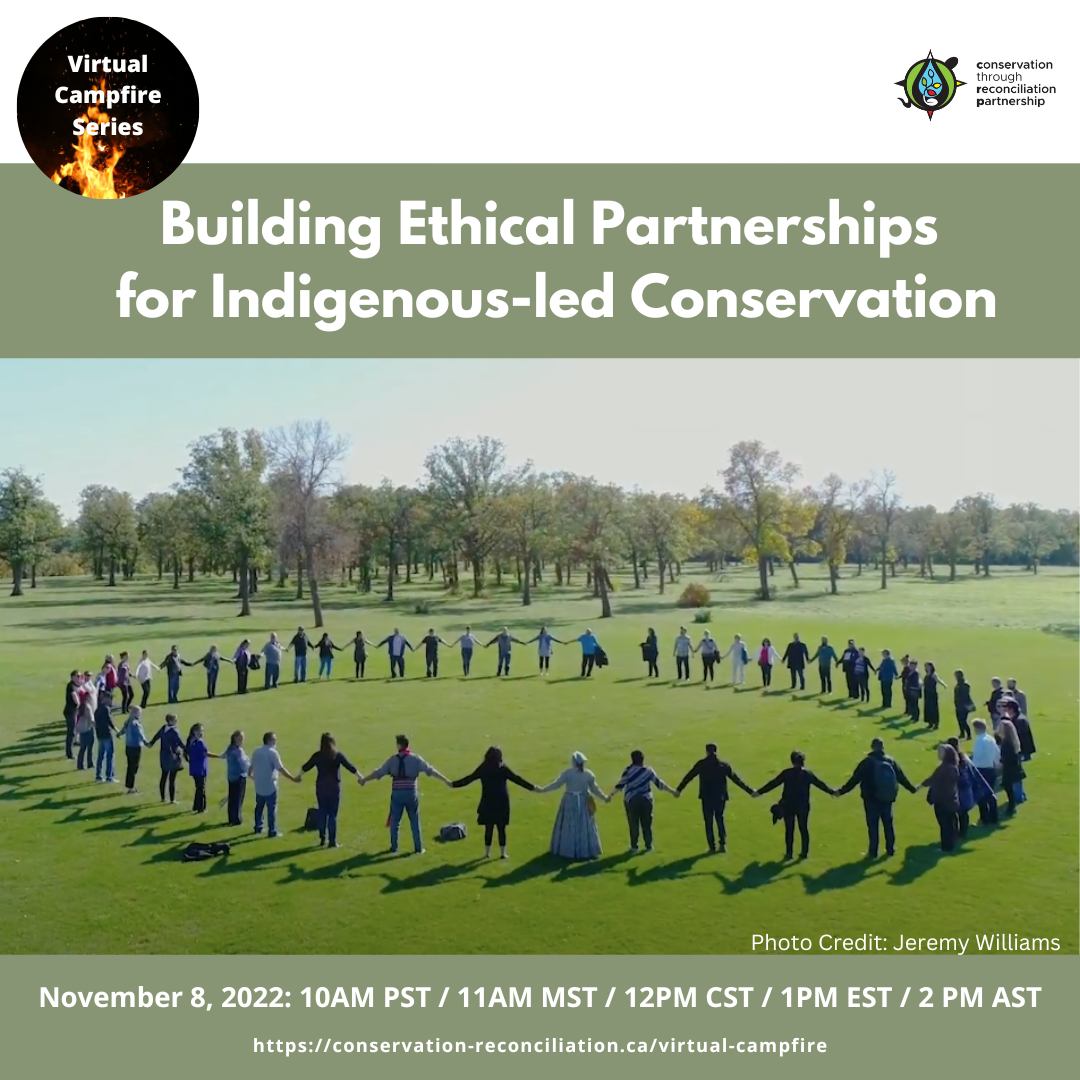Virtual Campfire Series
From 2020-2023, the CRP hosted a popular webinar series designed to share information and knowledge in support of Indigenous-led conservation and IPCAs. The partnership hosted 24 webinars during this three-year period on topics including the governance of IPCAs, land-relationship planning, stories from emerging IPCAs, and ethical partnerships in support of Indigenous-led conservation.
See the full Virtual Campfire Series here. Popular series from the Virtual Campfire Series are listed below.
Two-Eyed Seeing in Conservation Practice
On March 23, the Knowledge Systems Stream of the Conservation through Reconciliation Partnership and the Centre for Indigenous Knowledges and Languages co-hosted a dialogue that explores how the principle of Two-Eyed Seeing has inspired conservation practice across what is now known as Canada. In Mi’kmaq Elder Albert Marshall’s words, Two-Eyed Seeing or Etuaptmumk refers to “learning to see from one eye with the strengths of Indigenous knowledges and ways of knowing, and from the other eye with the strengths of western knowledges and ways of knowing – and learning to use both of these eyes together for the benefit of all.” In addition, Elder Albert reminds us that learning to see with both eyes comes with the responsibility to act on the knowledge we’ve gained. Moderated by Lisa Young (Unama’ki Institute of Natural Resources and the CRP Leadership Circle), this session was held to celebrate and honour the impact of Elder Albert Marshall’s leadership. We heard stories and experiences from Norma Kassi (Canadian Mountain Network), Elliot Fox (The Resilience Institute), Gary Pritchard (4Directions Conservation Consulting) and Chrystal Mantyka-Pringle (Wildlife Conservation Society Canada).
Land relations planning and indigenous protected and conserved areas
On October 22nd, 2020, the CRP and the IISAAK OLAM Foundation (IOF) co-hosted the second webinar in the IPCA Governance Stream, “Land Relations Planning and Indigenous Protected and Conserved Areas (IPCAs)”. This conversation featured Elder Joe Copper Jack (Senior Planning Coordinator, Yukon Land Use Planning Council), Marilyn Baptiste (Former Chief, Xeni Gwet'in First Nation, and CRP Leadership Circle), Steven Nitah (Senior Advisor, Indigenous Leadership Initiative, and CRP Leadership Circle), and Russell Myers Ross (Former Chief of Yunesit’in Government, and Dasiqox Tribal Park Initiative). Together, they explored relational approaches to land relationship planning using models and practices from Yukon Territory and Dasiqox Tribal Park (BC). They also discussed how this planning can inform pathways to IPCA establishment, including choosing how to govern.
A Dialogue with Leaders from Emerging IPCAs
On March 18, the CRP and IISAAK OLAM Foundation co-hosted a dialogue about emerging IPCAs across Turtle Island/Canada featuring Elders, community members and leaders from Kitskiinan Kawekanawaynichikatek IPCA (York Factory First Nation/Cree Territory/Northern Manitoba), Arqvillit IPCA (Inuit/Nunavik Territory/Northern Quebec), Bistcho Lake IPCA (Dene Tha’ First Nation/Northern Alberta), and Aki Sibi IPCA (Kebaowek First Nation/Algonquin Territory/Southern Quebec). Moderated by Monica Shore (IISAAK OLAM Foundation), this session hosted a dialogue with Elder Dr. Flora Beardy (Kitskiinan Kawekanawaynichikatek IPCA), Shaomik Inukpuk (Arqvilliit IPCA), Matthew Munson (Bistcho Lake IPCA), and Justin Roy (Aki Sibi IPCA).
Indigenous Women's Leadership Series: The Trailblazers of Conservation
On International Women's Day, March 8 2022, the IISAAK OLAM Foundation and Indigenous Leadership Initiative, as part of the Conservation through Reconciliation Partnership, hosted a storytelling circle to celebrate and honour Indigenous women trailblazers of all ages in conservation leadership. Moderated by Valérie Courtois (Director, Indigenous Leadership Initiative), this dialogue explored stories of breaking barriers, activating change, and asserting responsibilities to protect, restore, and reinvigorate the gifts of Earth Mother for current and future generations. The Honourable Ethel Blondin-Andrew, P.C. (Senior Leader, Indigenous Leadership Initiative), Bev Sellars (Former Councilor and Chief, Xat’sull First Nation; Senior Leader, Indigenous Leadership Initiative), Marilyn Baptiste (Conservation through Reconciliation Partnership Leadership Circle) , Amberly Quakegesic (Guardian Program Manager, Wahkohtowin Development GP), and Stephanie Thorassie (Executive Director, Seal River Watershed Initiative) shared stories about their personal journeys in leadership, the women who inspire them, and how they lead with love.
Building Ethical Partnerships for Indigenous-led Conservation
On November 8, 2022, the Conservation through Reconciliation Partnership hosted a dialogue on Building Ethical Partnerships for Indigenous-led Conservation. Through our sharing circles, dialogues, and virtual gatherings, we are hearing one key question loud and clear: “As a non-Indigenous person, how can I support Indigenous-led conservation?” In this session, we explored this question and more, through stories and examples of ethical relationships and partnerships that have been built, strengthened, or renewed. Each partnership is context-specific and depends on individual relationships as well as distinct community protocols, values, visions, and objectives. We are grateful to Dr. Kristi Leora Gansworth (Kitigan Zibi) for moderating this session, with guest speakers: Steven Nitah (CRP Leadership Circle and Nature for Justice) and Kevin Smith (Ducks Unlimited Canada); Chad Luke (Ktunaxa Nation), Richard Klafki (Nature Conservancy of Canada), and Kerri Garner (Ktunaxa Nation); Willard Sparrow (Musqueam Nation) and Nicholas Scapillati (Grizzly Bear Foundation).
Other popular videos created by the Conservation through Reconciliation Partnership
What is ethical space?
Dr. Reg Crowshoe, Danika Littlechild, and Eli Enns cultivated principles of Ethical Space at all levels of the Pathway to Canada Target 1. This led to the conceptualization of Indigenous Protected and Conserved Areas (IPCAs) in 2017. IPCAs promise to become the future of conservation in Canada as we collectively strive to protect and conserve 30% of lands and waters by 2030, nearly tripling Canada's protected areas in fewer than ten years.
What are Indigenous Protected and Conserved Areas?
Indigenous Protected and Conserved Areas (IPCAs) are lands and waters where Indigenous governments have the primary role in protecting and conserving ecosystems through Indigenous laws, governance, and knowledge systems. This video explores the central elements, benefits, and range of existing and emerging models of IPCAs and their critical role in achieving biodiversity targets and addressing climate change.
Video produced by: River Voices Productions Storyboard and script: Allison Bishop (Conservation through Reconciliation Partnership) Narration: Monica Shore (IISAAK OLAM Foundation) Contributors: CRP Leadership Circle.








